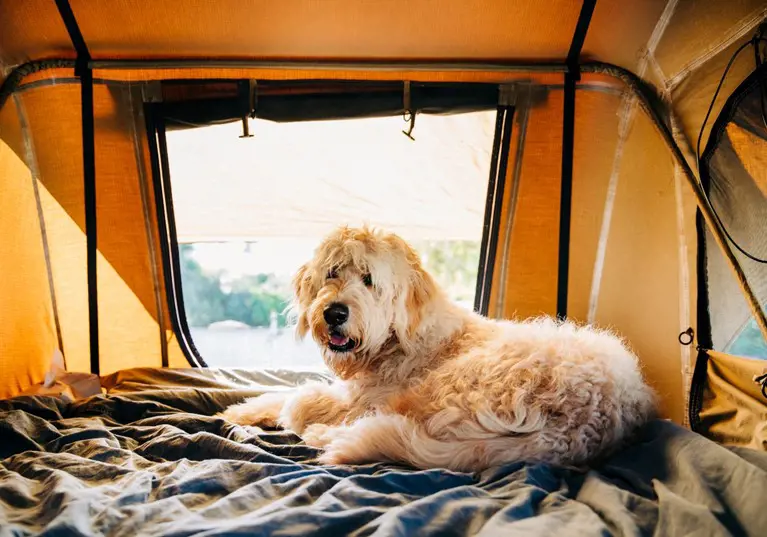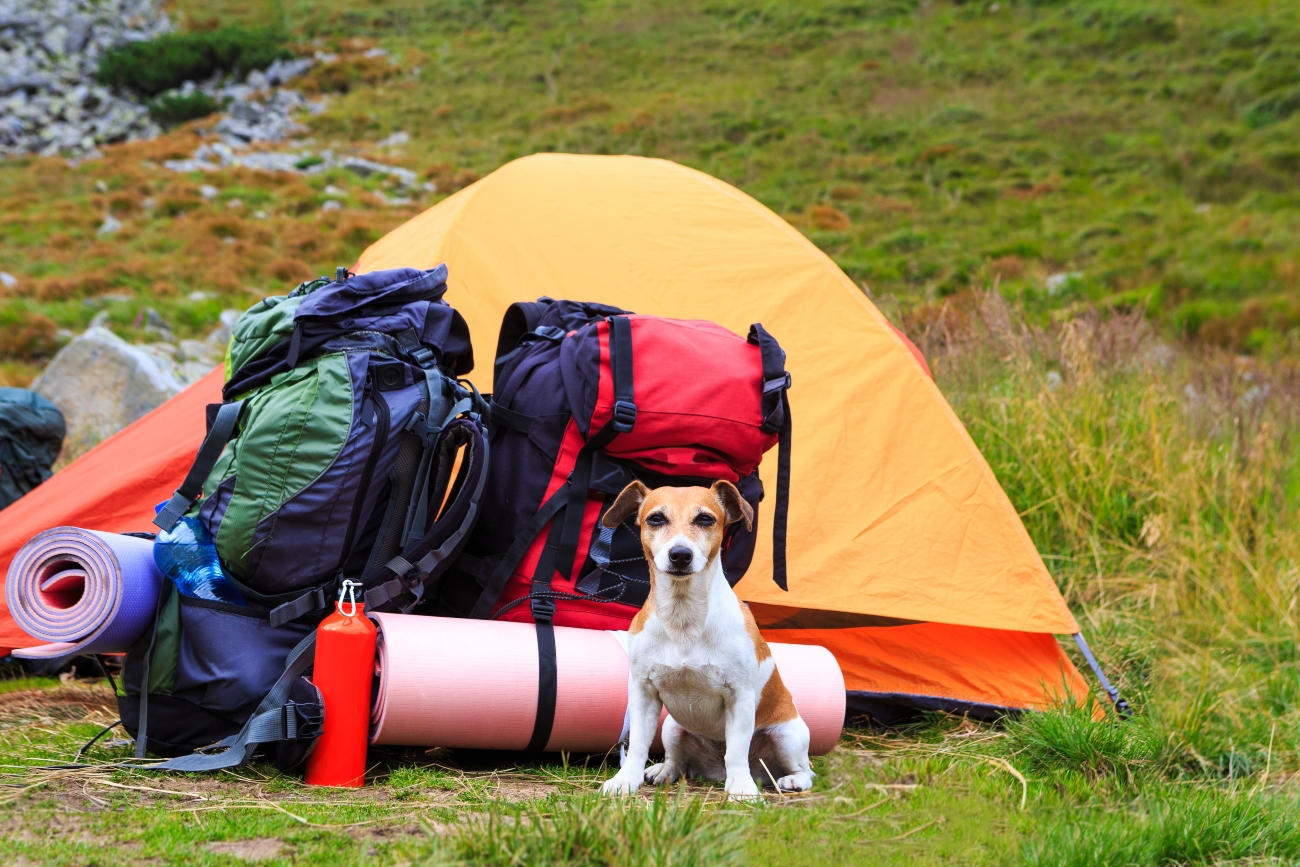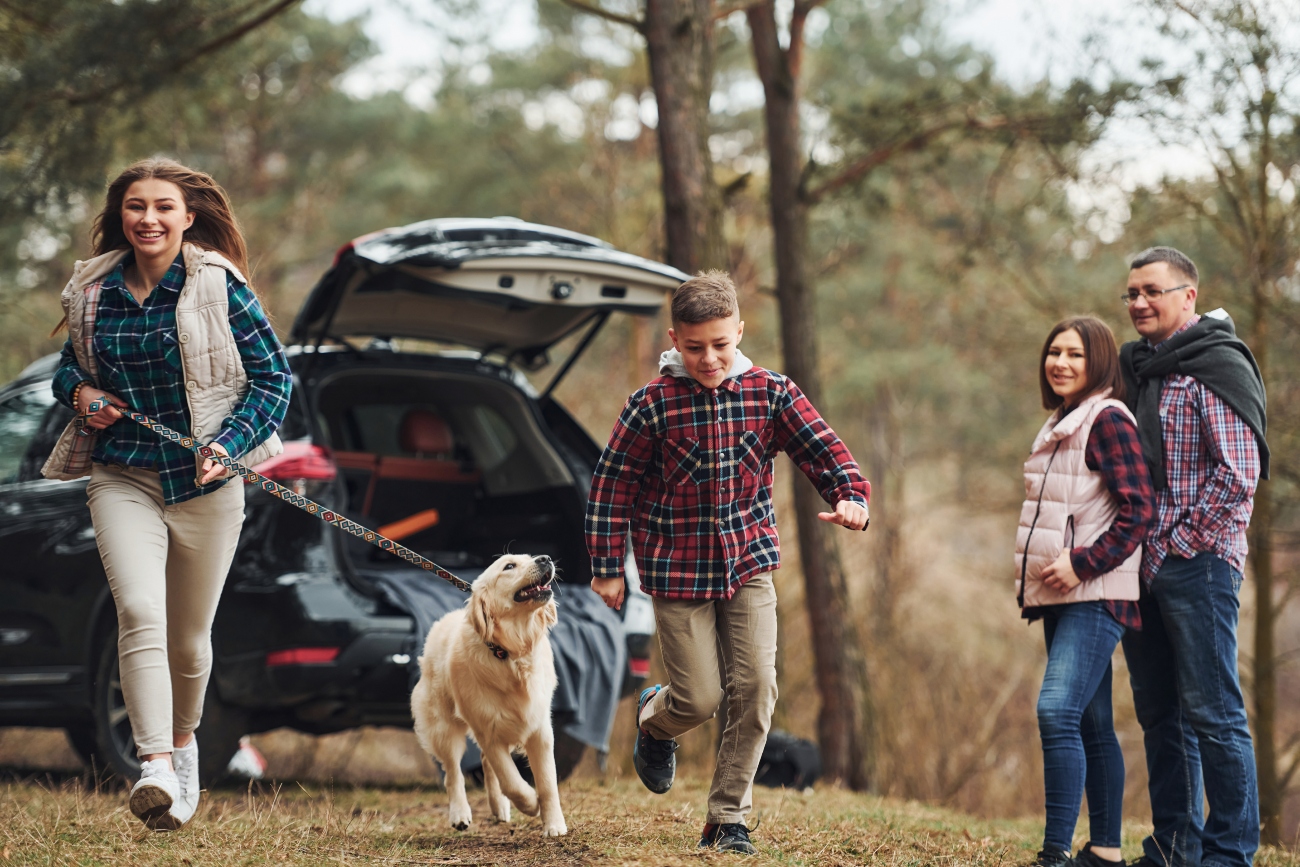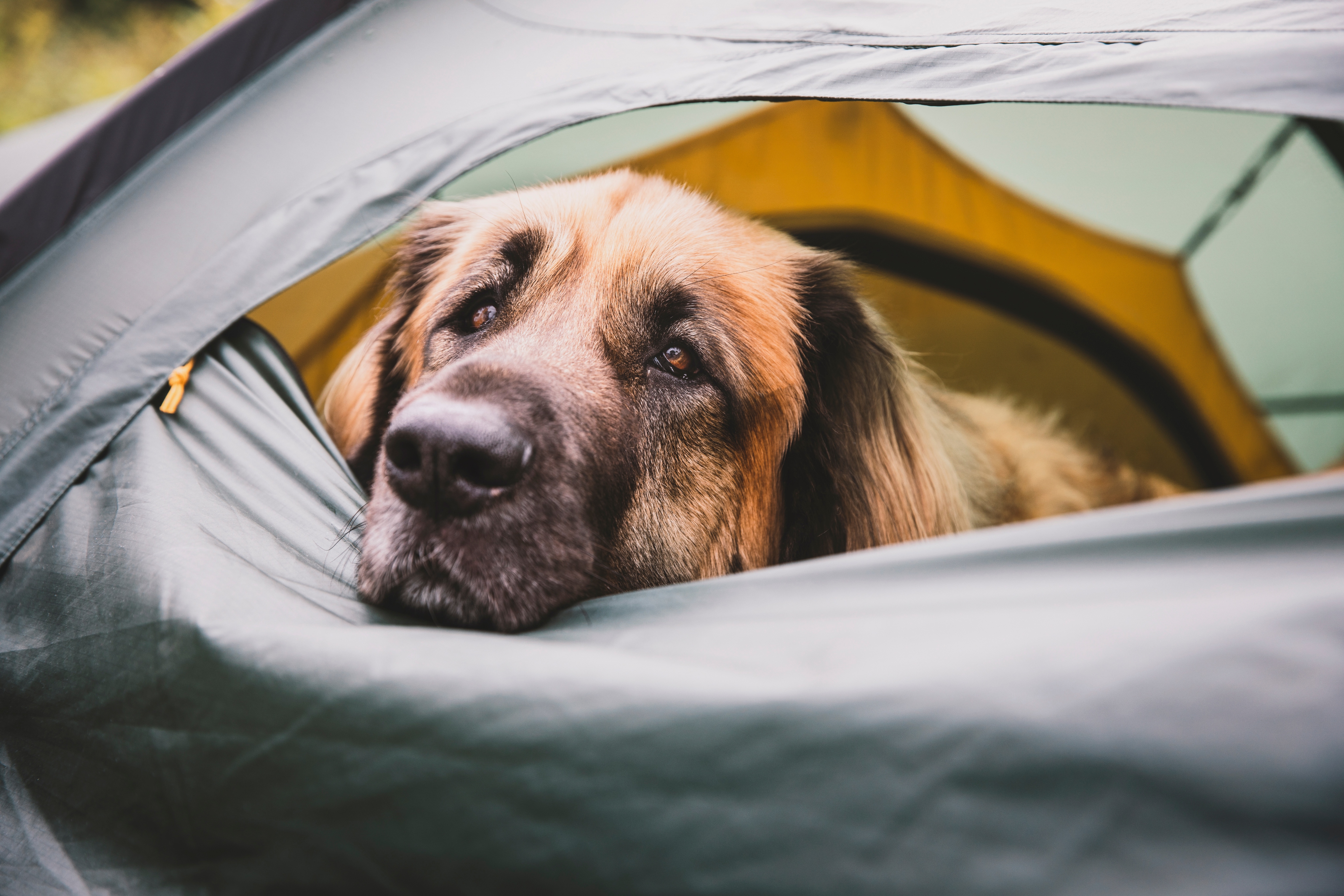Top tips for camping with dogs
17th August, 2022

You love your dog. You love camping. Why not combine the two? With a bit of preparation, camping with dogs can definitely be done.
Indeed, having your furry friend along can turn an enjoyable holiday under canvas into an unforgettable one. Better still, camping can often work out cheaper than other forms of holiday accommodation – leaving you with more money to spare for other expenses, such as your annual dog insurance costs.

Here are our top tips for a calm, stress-free camping holiday with your faithful friend.
Contents
- Think about whether your dog will enjoy camping
- Decide what sort of camping will best suit your dog
- Ease your dog into outdoor life
- Try some home 'camping' first
- Find a dog-friendly campsite
- Check the campsite etiquette
- Refresh their training
- Expect the unexpected
- Bring the first aid bag
- Pack some doggie essentials
- Consider a dog collar with a light
- Be a considerate camper
- Keep your own food safely apart
- Help them to sleep soundly
- Bring enough food with you
- Take plenty of treats
- Plan regular exercise sessions
- Never leave them alone
- Make sure the journey is enjoyable, too
- Bring along some memories of home
- Get them settled as soon as you arrive
- Keep their food fresh
- Keep things as familiar as possible
- Don’t tire or over excite them
- Bring plenty of towels
- Make sure your dog insurance is up to date
- Enjoy yourselves!
1. Think about whether your dog will enjoy camping
A camping adventure with your furry friend sounds pretty idyllic, doesn't it? However, a few days far from home, among strange people, in a strange canvas contraption won't work for all dogs. Some will just feel too anxious to settle.
That will be bad for your dog, of course - but also for you and your fellow campers. Mornings and evenings, in particular, should be quiet times at campsites, and the sound of an anxious, constantly barking dog will be a cause of irritation to many.
Likewise, if your dog isn't well behaved around people and/or animals, this is not the place to bring them. If you really have your heart set on a camping trip, consider putting your pet into kennels – or asking a friend to come and look in on them regularly. By the way, elsewhere on the blog we've got this useful feature on the steps you can take to help an anxious dog.
2. Decide what sort of camping will best suit your dog
If you do decide that your pet will handle a camping trip, the next question is: what sort of experience will be best for them?
If they like a lot of time spent on the sofa, a fairly relaxing time at a well-appointed campsite may be best. If, on the other hand, they love nothing better than to be yomping around in the great outdoors for hours, you might prefer to go somewhere a little wilder.
3. Ease your dog into outdoor life
Spending time under canvas, away from home and all its familiar comforts: this can be quite a disorienting experience for any dog, especially those at the more anxious end of the spectrum. So why not start out gently?
To get them used to spending time in new places, it's a good idea to break up your regular daily walk routine with a few day trips and picnics in less familiar locations.
4. Try some home 'camping' first
As well as trying out new places and activities for your pup, you should also get them used to spending time under canvas. If space allows, why not pitch your tent in the garden? Allow your dog to explore inside and get used to it before your actual trip.
Give them a reward when they eventually poke their nose inside.
5. Find a dog-friendly campsite
You really don't want to get on the road with your pooch, all eager and ready, only to arrive at your destination and be met with that dreaded sign: 'No dogs allowed'. The Camping and Caravanning Club have a list of the best dog-friendly campsites in the UK.
Other things to think about when choosing a campsite:
- How far away is it?
- What are the facilities like, for both dogs and people?
- Are there places on-site where you can safely dispose of your dog’s poop?
- If you ever want to eat out, are there some dog-friendly cafes, restaurants or pubs near at hand?
- Dog insurance costs less than emergency care without cover. Make sure your pup is protected today.
6. Check the campsite etiquette
Some campsites will only admit dogs that are kept on leads, while others are happy for your dog to go off-lead as long as they are trained to return quickly to your voice command. Note that these rules may vary with the seasons.
Some campsites might be happy for your dog to roam at will during the off-season. However, during the summer months, when the campsite is at its busiest, they may require that lead to be firmly attached.
7. Refresh their training
Certain aspects of your dog's training are going to come in particularly useful during a camping holiday. For example, they will need a failsafe recall command, which always brings them back to your side.
If your dog ever gets into difficulties or danger, or is causing a nuisance to other campers, you'll need to be able to bring them to heel promptly and with the minimum of fuss. We've got more top tips for successful dog walks in our ultimate guide.
8. Expect the unexpected
Nature can be unpredictable. Dogs can be too, if we are honest. So, be prepared for any eventuality.
For example, before you head off on your trip, make a laminated card with your dog's essential information, such as identifying characteristics, vaccination record, and health history, plus all of your contact details. Also make sure that their microchip information and tags are up to date.
Finally, ensure that you have dog insurance in place. If you’re concerned about dog insurance costs, it's worth remembering that the cost of any treatment that they might require, should anything go wrong while you are away, is likely to exceed your annual premium.
9. Bring the first aid bag
The PDSA website has a useful checklist for a good pet first aid kit, including such items as bandages, tweezers for tick removal, and antiseptic wipes.
We'd add an emergency blanket for treating shock or cold (those rivers can be chilly out of season!), some small pliers for extracting thorns, and some booties for protecting any paw injuries.
10. Pack some doggie essentials
Besides the first aid kit we've already mentioned, we'd recommend bringing along a dog water bottle, plus lightweight or collapsible food and water bowls. A little dog backpack can be useful, too, for keeping essentials such as treats and poop bags.
11. Consider a dog collar with a light
Being out late at night, gazing up at the night sky, is one of the best things about camping. However, it will get dark, especially in remote sites away from towns or villages.
Keep your dog visible at all times with a smart-looking LED dog collar.
12. Be a considerate camper
We already mentioned the importance of a rock-solid recall command to get your dog back by your side at a moment's notice. Other things you can do out of consideration for your fellow campers include picking up and properly disposing of all doggie waste.
Also, keep your dog near you at all times, and never leave them unsupervised – whether at the campsite, in your car, or out and about further afield. Some children or adults may not be as confident around canines as you.
Dogs that are scared can often act out of character. If your pup does bite someone, you could be asked for compensation.
Find out more about the current laws relating to dog ownership elsewhere on our site.
13. Keep your own food safely apart
Keeping your dog away from all those human treats that they love, but really shouldn't have, is easy enough at home. There, you have the benefit of drawers and high cupboards.
It gets a little bit harder in a tent, where everything is at your dog's eye, nose and paw level. So, keep your food away from them, in sealed containers.
You don't want your poor pup suffering a tummy upset while far from home – and you don't want to run out of food yourself! Certain foods like chocolate can be fatal for dogs, as we’ve listed elsewhere on the blog.
Get familiar with these foods so you can keep your faithful friend safe from harm.
14. Help them to sleep soundly
Even if you've prepared the ground as we recommended above, being in a completely new place can make dogs anxious. Having something familiar to snuggle into will help to keep the stress at bay.
Bring along their favourite bed, blanket, toy and/or cushion – or, if space is tight in the car, an inflatable sleeping mat could be the answer. Doggy sleeping bags are also available!
15. Bring enough food with you
It's a good idea to plan all your dog's meals before you set off – and definitely, at the very least, to make sure you'll have enough of everything. Running out of food miles from any shops, and being forced to improvise, could be stressful.
The sudden and unexpected change in their diet could give your dog a stomach upset, which could lead to some unpleasant moments for all of you. If your dog's health does give you cause for concern while you're away, remember that, as a Purely Pets customer, you can call our 24-Hour Vet Helpline at any time.
Calls are handled by veterinary nurses all with at least three years' experience. Something to think about when you’re weighing up dog insurance costs.
16. Take plenty of treats
Sticking with the theme of keeping your dog calm and relaxed at all times, we'd urge you to pack a few tasty, fun treats to help them relax and what will be new and challenging surroundings. Better still, place them in a kong toy and you have a tasty treat and a game all in one.
17. Plan regular exercise sessions

For you and your family, a camping break may be the perfect chance to sit around and do nothing. Remember, however, that your four-legged friend will have the same exercise needs as normal. You should choose your campsite based, in part, on the exercise opportunities within easy reach.
If you’re near the beach, check if dogs are allowed on at that time of year.
18. Never leave them alone
You may be used to leaving your dog at home on their own – but you won't be able to do this during your camping holiday. Not only will it be alarming for your dog to be left in a strange place: most campsites will not allow animals to be left unattended.
Leaving your dog alone also puts them at risk of being stolen. If the worst does happen, your pet insurance costs with Purely Pets will cover some advertising to help get your dog back.
19. Make sure the journey is enjoyable, too
In warm weather, keep the air conditioning on, and place shades over the back windows to protect your pet from direct sunlight. Plan as many service station breaks as you'll need, to allow your pup to get in a short walk and a toilet stop.
Don’t forget to pack a bowl and water for the journey, too.
20. Bring along some memories of home
Bring along one or two things that will remind them of home. Their doggie bed, with its familiar scents, is an obvious choice here.
If you can, you might want to hold back from giving it that last weekly wash before you go, as that comforting home smell could be just the thing to help your pet ease into this strange new world.
21. Get them settled as soon as you arrive
On arrival, your thoughts may turn immediately to unpacking the car and getting the tent up. And indeed, if it's getting dark or there's bad weather on the way, these may be a priority. But, if you can, take a moment to just let your dog explore, play and pee, before you get on with the business of unpacking.
22. Keep their food fresh
Depending on your dog's diet, and on how many days you'll be camping for, you may need some convenient solutions for keeping food fresh. For example, a cool box or bag filled with two or three ice bricks should help to keep food fresh for a day or two.
Alternatively, if you're heading off in a campervan or motorhome, you may want to bring along a small freezer.
23. Keep things as familiar as possible
Some people can find camping a little stressful but, as far as possible, continue to be the calm, fun, and energetic doggie parent that you are at home. Similarly, although conditions are very different here, try to keep their daily routine as unchanged as possible.
Dogs are famously creatures of habit, who like to know what to expect at all times of the day.
24. Don’t tire or over excite them
Being away in beautiful natural surroundings may be your cue for lots more strenuous exercise than you normally get. But remember that your dog will be familiar with, and rely on, a certain amount of excitement and exercise per day.
25. Bring plenty of towels
We've already mentioned that your dog may want to make a beeline for any water nearby. If there's a pond or stream within reach, the chances are that they'll want a paddle. They'll then come sauntering merrily back into the tent, treading (and possibly spraying) muddy water everywhere.
Not fun, especially in such an enclosed space.
So, let them have their fun – but bring along plenty of towels so you can quickly rub them down before they empty out the contents of the nearest pond all over your clothes and bedding. A couple of big towels at the entrance to the tent will be particularly effective.
Check out our water safety tips for pets, too, before you go.
26. Make sure your dog insurance is up to date
This will be a time of exciting new experiences for your furry friend – and, possibly, of new risks and dangers, too. Before you leave, take a moment to check that your dog insurance will cover the period you're away.
If the camping trip is making you feel more budget-conscious than usual, remember that the total dog insurance cost may well be less than that of any treatments or consultations you might need if anything goes wrong.
27. Enjoy yourselves!
If you decide that your dog will enjoy a camping trip, go for it! Being in the great outdoors together can be a great bonding time for you both. With a little preparation, you and your four-legged friend could be in for some wonderful times together.
Discover dog insurance costs today

Contact us to find out more about dog insurance costs, and to get a quote for the cover you need. It might be less than you think!
Benefits of cover through the specialists at Purely Pets can include:
- Lifetime cover to £15,000
- Online policy management
- Excess starting from £60
Give us a call today and protect your pup for your next adventure.
Helpful Pages
Recent Posts
Pet Insurance Quote
- 98% claims paid *
- Claims paid directly to vets
- 24/7 vet video consultations
- Interest free monthly payments




